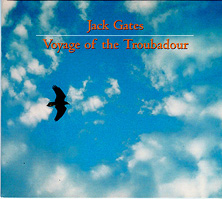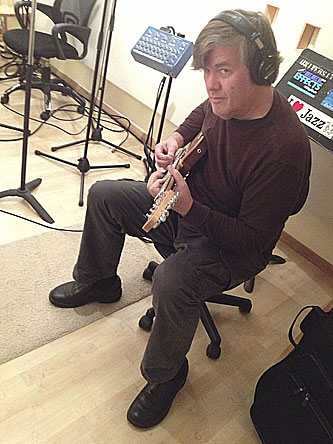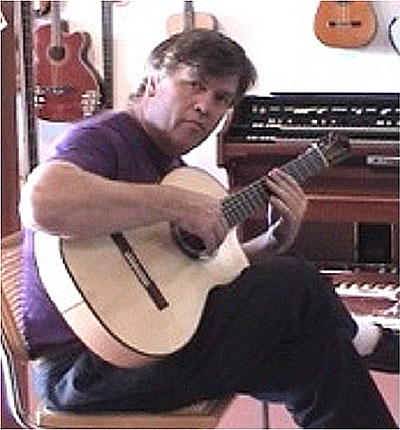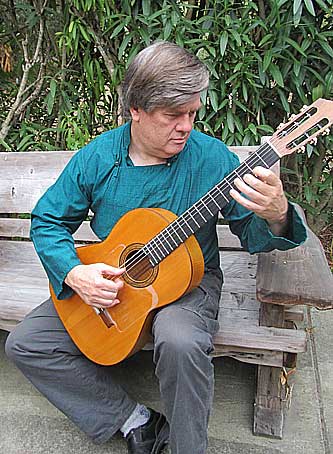 Northern
California based guitarist Jack Gates exhibits a mastery of
a wide range of jazz guitar genres on the 2014 CD release of Voyage
Of The Troubadour. Assisted by the fine rhythm section
of Phil Thompson (drums) and Dean Muench (bass), as
well as featuring the vocals of Sharyl Gates, the 12 track
CD is best described as a mix of Latin, Brazilian and Afro-Cuban sounds
all accented by Jack’s nimble fretboard work. Commenting on the
title, Jack adds, ‘The traveling troubadour concept, was how
music moved from place to place for hundreds of years. Generally,
the music was made with just a couple of stringed instruments and
maybe some percussion. On this album I wanted to capture that sort
of sparseness with just a few instruments and occasional voice, and
have the music subtly reflect different styles, motifs and rhythms
that I have discovered and enjoyed playing during my career.’
As a guitar instrumentalist, Jack Gates proves his worth on his latest
CD, while the addition of Sharyl's vocals on several tracks adds to
the overall variety of music showcased here. Jack Gates' Voyage
Of The Troubadour is a masterpiece of subtle and refined jazz
guitar sounds. www.JackGatesMusic.com
Northern
California based guitarist Jack Gates exhibits a mastery of
a wide range of jazz guitar genres on the 2014 CD release of Voyage
Of The Troubadour. Assisted by the fine rhythm section
of Phil Thompson (drums) and Dean Muench (bass), as
well as featuring the vocals of Sharyl Gates, the 12 track
CD is best described as a mix of Latin, Brazilian and Afro-Cuban sounds
all accented by Jack’s nimble fretboard work. Commenting on the
title, Jack adds, ‘The traveling troubadour concept, was how
music moved from place to place for hundreds of years. Generally,
the music was made with just a couple of stringed instruments and
maybe some percussion. On this album I wanted to capture that sort
of sparseness with just a few instruments and occasional voice, and
have the music subtly reflect different styles, motifs and rhythms
that I have discovered and enjoyed playing during my career.’
As a guitar instrumentalist, Jack Gates proves his worth on his latest
CD, while the addition of Sharyl's vocals on several tracks adds to
the overall variety of music showcased here. Jack Gates' Voyage
Of The Troubadour is a masterpiece of subtle and refined jazz
guitar sounds. www.JackGatesMusic.com
mwe3.com presents an interview with
JACK GATES
 mwe3:
Can you tell us where you’re from originally and where you live
now and what you like best about it?
mwe3:
Can you tell us where you’re from originally and where you live
now and what you like best about it?
JACK GATES: I am originally from Kensington, California, near
U.C. Berkeley. I am now located in El Sobrante, California, which
is more rural. My wife, Sharyl and I enjoy hiking in Wildcat Canyon
Regional Park which is adjacent to our house. We have horses and other
animals on the property and there is a lot of wildlife nearby, and
this provides marvelous inspiration for musical thinking and playing.
mwe3: What did you set out to achieve on the Voyage
Of The Troubadour
album? Is there a musical evolution there? Why did you decide to use
that title for the Voyage Of The Troubadour album?
JACK GATES: My experience as a sideman, bandleader, producer
and arranger has brought me into contact with musicians from all corners
of the globe. The opportunity to play the music of Brazil, East India,
Peru, Spain and many other countries, with folkloric, jazz and popular
musicians steeped in those traditions, has provided me with a rich
melodic, harmonic and stylistic vocabulary.
The CD, Voyage Of The Troubadour, is an exploration of some
of these musical places, shaped by my own guitaristic vision that
uses elements of jazz, classical, flamenco and samba/bossa nova techniques
and flavors.
mwe3: What was it like growing up during the golden era of
the 1960's Berkeley and San Francisco music scene? I was reading you
even attended classes with Julian Bream? What was that like? How did
you get interested in classical guitar and jazz during and era when
rock was so influential and how do you balance your love of all the
different musical and guitar genres?
JACK GATES: I was very lucky to hear the finest musicians of
the psychedelic era, including The Grateful Dead, Santana, Azteca,
Tower Of Power. These bands often played for free in Provo Park in
Berkeley, which seems incredible in our current age.
Local musicians that I performed with, such as drummer Tyler Eng,
went onto success with Greg Kihn, Santana and many other bands. Members
of Credence Clearwater Revival attended my high school and lived in
my neighborhood when I was growing up.
I heard many iconic legends of the electric guitar, so this had a
profound influence on my concept of sound, touch, amplification, bending
of notes, vibrato, etc.
I became fascinated with classical guitar, studied with David Tanenbaum
and was able to audit a fantastic master class that Julian Bream gave
in San Francisco. It was a remarkable display of musical interpretation,
passion for the guitar and incredible control of tone color using
no amplification, just a highly refined right hand technique.
The guitar has always fascinated me, initially I didn’t see the
acoustic guitar, electric, classical, rock worlds as being unrelated.
I have always viewed the instrument as a musical palette, almost like
a blank canvas that we, as guitarists can paint the notes with.
At the same time, I found that to excel in any area of guitar playing,
I had to devote myself to one approach for a period of years. This
was particularly true for classical guitar, which is a very demanding
and technical discipline.
mwe3: I remember your great Eastern music influenced album
Morning Song, Evening Song with Tim White. Was that album a
result of your studying with Ali Akbar Khan? What’s new with
Tim these days and do you have some fresh reflections on making that
album?
JACK GATES: Tim White and I are currently in the process of
creating a new duo recording, which is based on improvisations using
a combination of traditional raga forms, flamenco, jazz and classical
music.
Ali Akbar Khan was one of the greatest creators in the sphere of Hindustani
music of the 20th Century. His contribution to music education, improvisation
and creation is continuing to resonate in the 21st Century through
the work of his sons, his students and many disciples.
Morning Song Evening Song was a landmark recording for us as
a duo, most of the material was totally improvised using some raga
like structures, but also incorporating bamboo flute and South Indian
mrdangam.
Tim White has been performing some traditional Hindustani sitar music,
but has also worked as a recording engineer on Derek Trucks’
recent CD. His latest release, Inhale Slowly, received the
Best New Artist Award from the Zone Music Reporter for radio airplay.
 mwe3:
From a recording perspective, did you set out to be very eclectic
on the Voyage Of The Troubadour CD? There’s quite a few
genres of guitar music covered on the CD. How did you determine how
many styles you wanted to cover and are there other genres of music
you didn’t cover here that you wanted to?
mwe3:
From a recording perspective, did you set out to be very eclectic
on the Voyage Of The Troubadour CD? There’s quite a few
genres of guitar music covered on the CD. How did you determine how
many styles you wanted to cover and are there other genres of music
you didn’t cover here that you wanted to?
JACK GATES: The current CD reflects my musical influences and
tastes, although I listen to many more styles than I could ever perform.
I do want to continue new explorations of Latin, Asian and North American
musical forms.
The common sonic quality that I work with on the CD is a natural,
organic sound with relatively few effects.
On the new duo CD slated for 2016, my wife, Sharyl and I are exploring
music with a flamenco influence, electric music with influences of
Jimi Hendrix and steel string guitar sounds influenced by Joni Mitchell.
mwe3: How would you describe Antonio Carlos Jobim’s influence
on you and this album? The Voyage Of The Troubadour CD sounds
like it was created for not only jazz guitar lovers but also for Jobim
and Brazilian music fans too. There is a Jobim cover here, in fact
the only cover I’ve heard of “So Danco Samba”. How
did you find that Jobim track?
JACK GATES: Jobim is really one of the greatest composers...
he discovered new ways of combining traditional Brazilian forms with
jazz and classical harmony. His music uses unexpected chord combinations
that have probably influenced most guitarists and composers, including
my own style. Jobim’s style incorporates Afro-Brazilian, choro,
samba and that becomes a springboard for my own explorations. So “Danco
Samba” is an older Jobim tune that Joao Gilberto sang a beautiful
version of on an early recording.
mwe3: You work a lot with your wife Sharyl on this CD. How
would you describe the way you work with Sharyl and do you share the
same musical influences? What is Sharyl’s background in the music
/ recording world? Who else was played on the Voyage CD and
who else was involved in the recording process, mixing, mastering
and the artwork?
JACK GATES: Sharyl and I often improvise and experiment to
find new compositional ideas. Sharyl has more background in folk music
and Elizabethan music and theatre. Her background as a visual artist
allows her to develop lyrics with strong imagery.
The drummer on the CD is Phil Thompson, who has performed with Toniho
Horta and Marcos Silva and is a master of Brazilian and Latin drumming
styles. He is one of the most in demand percussionists in Northern
California.
The bass player is Dean Muench. Dean is one of the directors of the
Jazz School in Berkeley and has extensive experience as a sideman
in Latin and jazz music.
I collaborated with Mark Allen Piccolo on the recording. I recorded
all the solo and duo pieces at home. The ensemble tracks were recorded
by Mark and I at guitarist George Cole’s studio.
The mixing and mastering were done by Dan Feiszli. The CD was recorded
using Schoeps, Neumann and Telefunken mics in Pro Tools.
Artist Bob Giles created the cover art using photos by Sharyl Gates.
mwe3: What guitars are you featuring on the Voyage Of The
Troubadour album and how do you determine what guitars you want
on each track? It sounds like there’s electric guitars as well
as classical guitars on the Voyage CD. What are some of your
favorite guitars and what innovations or trends in the guitar world
and the recording world interest you these days?
JACK GATES: The main acoustic guitars on the recording are
classical guitars by Antonio Marin and John Mello. Antonio Marin is
considered to be one of the greatest luthiers of Granada, Spain. John
Mello is a California friend of many years, who is also a very fine
luthier building excellent handmade instruments.
I prefer classical guitars with a combination of traditional Spanish
and bright modern sound, so a blend of Northern and Southern European
sounds.
The main electric guitar on the recording is a Telecaster copy that
I assembled from Warmoth parts, that uses a Frailin bridge pickup
and humbucker in the neck. The amp was a custom Clark tweed amp miced
with a Beyer ribbon and Shure Sm57 on two different Alnico speakers.
mwe3: In addition to recording music, you’ve also done
album production work for other artists. What are some of your favorite
productions and, for those who don’t know much about how to make
an album, what do you find is involved in producing an artist?
 JACK
GATES: My favorite production was Larry Stefl’s CD, as I
got to work with two masters of Afro Cuban jazz music, John Santos
and Wayne Wallace. Percussionist John Santos really created a wonderful
trance like atmosphere in the studio, his hand drumming was really
hypnotic.
JACK
GATES: My favorite production was Larry Stefl’s CD, as I
got to work with two masters of Afro Cuban jazz music, John Santos
and Wayne Wallace. Percussionist John Santos really created a wonderful
trance like atmosphere in the studio, his hand drumming was really
hypnotic.
A producer must be able to complete all the jobs in a recording process.
I would often do pre production planning for hours, discover and hone
arrangements, refine performance techniques, coach vocalists and instrumentalists,
and worked to unlock the creativity of the artist. Many artists have
illusions regarding the recording process. The most important thing
is to start with good material, players and performances. If the drummer
knows how to tune and set up his drums, the recording will reflect
that preparation.
mwe3: How about mentioning amps and effects and stings and
picks you use on the Voyage CD as well as in a live setting?
How much do you let technology and computers influence your writing
and recording?
JACK GATES: I usually play fingerstyle, except when I do electric
solos, when I sometimes use a Fender heavy pick. I am currently using
a Mesa Express 5:50 amp, but I've used a lot of vintage Fender amps
in the past.
I often use Dunlop or Tomastik .11 gauge strings on electric and normal
tension Galli, Augustine or Luthier brand strings on classical guitars.
If I had the option, I would record everything in analog, because
I prefer the sound for most things, however, this is impractical.
I do enjoy the flexibility of Pro Tools, but I have moved away from
heavily edited music.
I have actually made a transition away from heavy use of computers,
midi or synthesizers for my music.
mwe3: What are you hoping listeners will come away with after
hearing Voyage Of The Troubadour and what other plans do you
have musically for 2014 and 2015? Is there some direction you’d
like to take your music in the future?
 JACK
GATES: The CD can be heard on many levels. If you want to bask
in the sensuality of the sound, it has that aspect, but if you want
to think more deeply, the music has some subtle changes of mood, style
and texture for the more inquisitive listener.
JACK
GATES: The CD can be heard on many levels. If you want to bask
in the sensuality of the sound, it has that aspect, but if you want
to think more deeply, the music has some subtle changes of mood, style
and texture for the more inquisitive listener.
Current projects include a new duo CD with my wife Sharyl Gates, and
another new duo CD with sitarist Tim White.
In the future I am hoping that my recordings will become more intense,
deeper, more involving and involve a more complete exploration of
all the capabilities of the guitar.
Thanks
To Jack & Sharyl Gates @ www.JackGatesMusic.com



